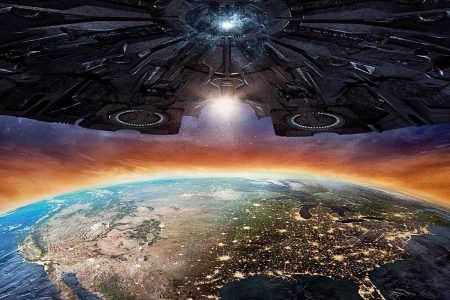August 10, 2018 – Yesterday Vice President Mike Pence addressed a U.S. Department of Defense audience announcing the first stages for development Donald Trump’s latest musings that seem to serve as the framework for government policy initiatives in America these days. Spence’s comments were all about what the other guys are doing and that’s why America needs to do it too: build a Space Force.

When the U.S.S.R. and the United States were at loggerheads in the Cold War of the 20th century, both flirted with the militarization of near-Earth outer space. The Soviets launched human-manned orbiters to spy on America and its allies in the 1960s. The Americans put spy satellites in orbit and had plans to create a military space station. These activities happened despite both countries signing a United Nations agreement for the peaceful use of outer space. He talked about how Russia as the successor to the Soviets, and China, are both militarizing space, and therefore, the U.S. needs to as well.
For those of you who remember the “missile gap” days of the 1950s and 60s, the speechifying of the Vice President should sound all too familiar. The U.S. has to close the gap and become the dominant military presence in space, or else be vulnerable to its enemies, the Russians who President Trump has cozied up to, and the Chinese, America’s largest trading partner and now the subject of an ongoing tariff war.
The United States already has a military presence in space. It has been launching an unmanned shuttle to orbit the Earth called the X-37B. Conceived in 1999 the United States Air Force has been putting classified payloads on the X-37B for years. So a military space program is operating quite well without being a separate branch of the Armed Forces. In fact, 60 different U.S. government agencies within the Department of Defense are currently active in space-related projects. So you would think that the Americans have this completely covered.
But Trump likes the name “Space Force” and that is more than justification for creating it. Is the reason no more than it will look good on election swag with logos ablaze with those words in the run-up to 2020? Described by many in current and former government defense posts as a “solution in search of a problem,” the Space Force shines a bright light on what has been pretty much played down in the military for years. America under President Trump is finally coming out of the space closet.
Where does NASA fit in with Trump’s nascent Space Force?
Today NASA has funds devoted to detecting Near-Earth asteroids and the threat they pose to the planet. This requires a global defense capability to defend the planet from a potentially catastrophic collision. Should NASA be passing this responsibility on to Trump’s new Space Force? At least the justification in defending the high ground of space is warranted in this scenario.
NASA’s current director, Jim Bridenstine, has been a big supporter of the idea of a military presence in space largely to ensure that NASA’s satellites remain protected from military threats coming from the ground or in orbit. And NASA has conducted experiments on behalf of the Department of Defense on the International Space Station, and before that on the American Shuttle Program.
But Bridenstine sees the return to the Moon as the place to plant America’s dominance in space backed up by military presence. This seems to be a primary justification for the return to the Moon. And beyond the Moon, it is a driver for establishing a human presence on Mars let alone elsewhere in the Solar System.
So much for international cooperation in the exploration of space and in the development of a permanent lunar base. Bridenstine has even speculated on what ranks future space personnel should wear in this new world of a military space presence preferring the Navy over the Air Force and Army. The reference he identifies is from Star Trek. Think Captain Kirk and Picard and you get why he has been quoted in a Bloomberg news article stating “if you look at the science fiction movies, all of the space military folks, they’re all admirals, which is, of course, a Navy rank.” So Admiral over General seems to be his preferred route.
Where will private space companies fit in with Trump’s nascent Space Force?
It would seem with NASA’s plans to get out of the low-Earth orbit business, the International Space Station, that commercial space companies will largely take over this domain. The Space Force then will be defending America’s business interests in space, not too dissimilar to much of America’s 19th and 20th century military actions in defense of the United Fruit Company in Central and South America, and the launch of at least one expansionist war, the Spanish-American at the end of the 19th, to protect U.S. businesses in Cuba and seize Spanish colonial territories overseas.
And who will the Space Force be fighting once it is formed?
The enemy now is Russia, the country that shares with the United States much of the burden of building and manning the International Space Station. And then there is China who for “intellectual property” issues has been shut out of a co-operative program for the peaceful exploration of space by the U.S. Certainly the U.S. isn’t considering any of its other international partners in space such as the European Space Agency, Japan’s JAXA, India’s ISRO, the Canadian Space Agency, to name just a few, as likely enemies to warrant an independent military force to protect America’s space interests. Of course, there could always be aliens with UFOs in our future lurking out there ready to pounce on humanity and conduct experiments on us. Shouldn’t that justify developing battleships to plow the seas of space or early warning systems on the Moon firing nuclear cannons at an approaching alien fleet? Does the President, Vice President, or Bridenstine believe in that future reality?
















